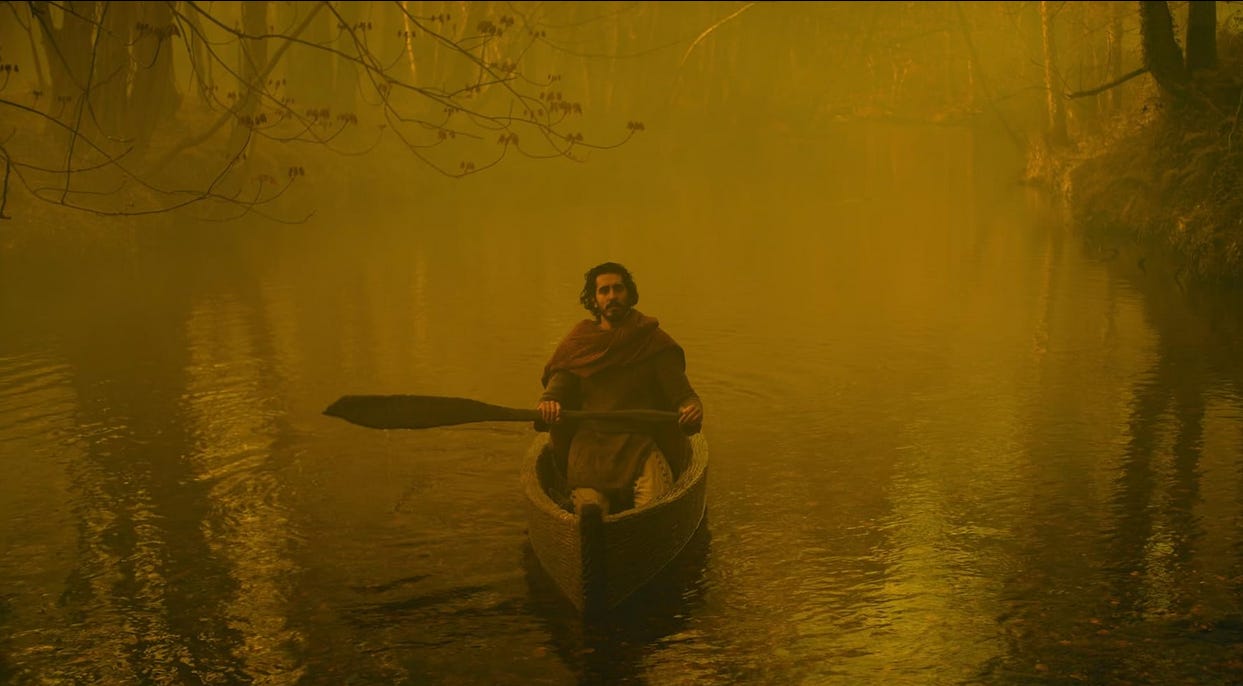Happy Wednesday Everyone,
Did you get a chance to watch the scene I included from The Green Knight? I’ll put it down below in case you didn’t. And don’t worry, I’m going to do my best not to spoil the entire movie for you yet. I still want you to go watch it.
Unfortunately, that means a bit of vagueness, and a bit of effort on your part in reading this Contour Line.
A reminder that I will be going live at 10am EST, on Friday, 9.19.2025, for the weekly Cultivar Coffee Chat. Join me to hang out and chat about the intersections between life and leadership, bring your own stories and questions.
So. The theme this week, posed to you as it was to me:
“what are the ripple effects of not being yourself?”
How does Gawain, the coward in the clip, help us examine this?
My wife and I went to see the movie when it came out in theaters, and it was the only movie I can ever remember having to explain the ending to her; typically, it’s the other way around.
Of course, it's a retelling of the Arthurian legend of Sir Gawain and the Green Knight, with many embellishments; but the film spoke to me deeply as a veteran, as someone who has been in leadership positions, and as a partner and father whose done a lot of personal work on my emotional intelligence.
For this reason, I believe in its own way the movie asks the viewer the same question(s).
What it means to be a knight, to be chivalrous.
What does it mean to be a man (we can exchange the theme to “leader” for Cultivar’s purposes), to honor one’s word, to have a legacy?
To fight against nature, both internal and external.
What does it mean to wield power?
What does it mean to take ownership of one’s actions and future?
I’ll keep the relevant point focused on what is in this scene.
Gawain owes a debt to the Green Knight, and seems to have struggled in the past year to bring himself to this point of being able to confront his actions.
Despite being a knight himself, striving to be seen with respect, Gawain has always been afraid.
He has always projected chivalry.
Even though it is clear he lacks the courage to take the equivalent blow he had no problem imparting onto someone else in an attempt to appear as something he is not.
Faced with the consequences of his ego and lack of authenticity, we get the following exchange (paraphrased):
“1 year or hundred, it wouldn’t make a difference … Is this, really all there is?”
“What else aught there be?”
Despite one of the interpretations of the original story being that it's about the battle between Christianity and Pagan folk beliefs in medieval times, I do not believe that in this scene, Gawain is referring to his soul, heaven, or hell.
I believe he is realizing on the lack of more time to find his courage.
The sudden end, with no more chances to explore who he really is, to grow.
The simplicity of consequence born of unexamined privilege.
He wanted to be seen as a good, chivalrous knight, but his focus was on the perception others had of him rather than the character and integrity he was supposed to develop.
In realizing what really matters, at the end of his life, he has neither integrity nor action in alignment. In denying his true self for so long, he cannot accept his true self, and its fate.
In this scene, we can assume that everything about his chivalrous, knighthood persona was, and is, performative.
Now, I’m not going to spoil the movie for you - go watch it, and we will revisit this movie and its lessons in November when I’m writing longer essays again. That gives you a month and a half to watch it.
But here’s the effort required on your part:
If you were Gawain, and chose to flee from such circumstances, how would you feel in your heart, in your soul, about yourself?
If you think you’ve ever had imposter syndrome, imagine this guy.
How far do you think he might go to compensate? How performative and toxic a leader might he become to deny the truth to himself and others, to hide that he is a coward?
And, at the end of his days, would that extra time mean anything?
Will a life devoid of authenticity, values, and true meaning really be “all there is?”
How fulfilling might life have been if he had been his authentic self from the beginning, and grown from that into who he wanted to be, versus pretending to be someone he was not? How much easier would it be, to face death?
Every day is another opportunity to not flinch and flee.
I’ll let you think on it.
Until Next Time,
- Chris
Contour Lines is my anecdotal newsletter segment that weaves personal musings from my life with my thoughts on leadership, as well as personal and organizational development.
If something resonates, leave a comment, or reach out to chat - I always love hearing people’s stories.
Want to chat about personal growth or walking a path of authentic leadership but aren’t sure were to start? You are always welcome to book a free call to either get fresh perspective or see if we’d work well together in cultivating your capacity to lead.



